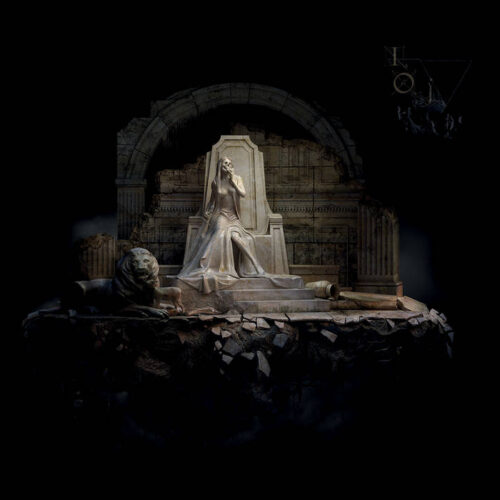Traditionally, majesty has often manifested itself through a few conventional technical means in extreme metal. In Igurgitating Oblivion’s new opus, however, nothing is traditional. There are no orchestral sequences, no operatic pastiche and no synthesizers. Instead, it’s the finesse of the arrangements that lend epic grandeur to this sinister, nightmarish music.
Aesthetically, we’re dealing with a seamless synthesis of several worlds. The sparsely repetitive structures, averaging fifteen minutes, are reminiscent of progressive rock, while the rhythmic and harmonic richness is reminiscent of jazz. This is particularly evident when the guitars lose their distortion and let ring chords over which the drums can freely unleash. There are also plenty of string solos that sound like something straight out of a jazz fusion album. However, the long, brutal sequences soon remind us that the duo is essentially a death metal band. Here, the impeccable performance of drummer Lille Grüber (Defeated Sanity), in his second collaboration with the band, must be highlighted. When the music takes fast, angular and aggressive turns, Grüber hammers the pulse with a power matched only by the detail and density of his rhythmic ornamentation. In addition, the voice generally takes on a more mid-range register than before. With ever greater emphasis on atmosphere, this recalls the best of avant-garde, dissonant black metal. But most of the time, the totality of these elements is reminiscent of monuments of contemporary orchestral music, such as Edgar Varèse’s ‘Amériques’ or György Ligeti’s ‘Atmosphères’.
But the main quality of Ontology of Naught is its sense of macrostructure. There’s a meticulously woven narrative thread running through the album, passing through a variety of textures and dramatic effects. Although the music was primarily conceived by two guitarists, there’s a keen sense of dynamics. The compositions know how to relay the guitars in the background to let other timbres take the lead and create depth of field. In the most ambient moments, it’s hard to tell which instrument shines more brightly between guitar, bass, vibraphone and piano. Yes, this album is full of collaborations that enhance the orchestration.
Other techniques, such as the inclusion and layering of multilingual monologue samples, add dramatic effects that guide the ear throughout the album. There’s also a poignant detour into a moment of almost mystical serenity during the transition from the third to the fourth track. One track ends with a mantra sung and harmonized by women’s voices, giving way to Tibetan bowls and the words “No more” repeated ad nauseam and filtered through sound processing. The next track opens with a harmonium drone and a new harmonized vocal sequence punctuated by a few strokes of singing bowls. This somewhat orientalizing concoction of Asian timbres, electric guitar and classical vocals then evolves into a return to heaviness and progressive escapades.
In short, Ontology of Naught is the result of a long process of composition, sound sculpture perhaps, which must be appreciated in its detail. It’s a work greatly magnified by the possibilities of the recording studio, which pushes the genre very far in its expressive possibilities. The mix of influences is immensely richer than the sum of its parts, and the extreme aspect of the music is a sine qua non condition that must be embraced to appreciate its nuances.
























